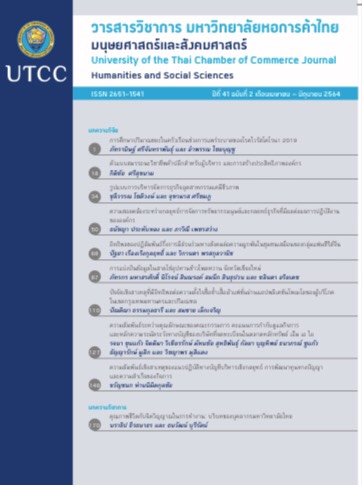การศึกษาปริมาณขยะในครัวเรือนช่วงการแพร่ระบาดของโรคไวรัสโคโรนา 2019
Main Article Content
บทคัดย่อ
บทความวิจัยนี้มีวัตถุประสงค์เพื่อสำรวจปริมาณ รูปแบบการจัดการ และอุปสรรคในการจัดการขยะ หน้ากากอนามัย ขยะรีไซเคิล และขยะอาหารในครัวเรือน ช่วงการแพร่ระบาดของโรคไวรัสโคโรนา 2019 ด้วยการเก็บรวบรวมข้อมูลจากแบบสอบถามออนไลน์ จำนวน 438 ชุด ในพื้นที่กรุงเทพฯ และปริมณฑล (จังหวัดนนทบุรี สมุทรปราการ นครปฐม ปทุมธานี และสมุทรสาคร) และวิเคราะห์ข้อมูลด้วยสถิติเชิงพรรณนา ได้แก่ ค่าความถี่ และค่าร้อยละ ผลการศึกษา พบว่า มีปริมาณขยะหน้ากากหน้าอนามัยและขยะรีไซเคิลเพิ่มขึ้น ในขณะที่ขยะอาหารมีปริมาณเท่าเดิมกับช่วงเวลาปกติ โดยรูปแบบการจัดการขยะเหล่านี้ส่วนใหญ่ คือ การทิ้ง รวมกับขยะมูลฝอยทั่วไปของครัวเรือน โดยมีสาเหตุของการจัดการขยะแต่ละประเภทแตกต่างกัน คือ 1) ขาด ระบบการจัดการขยะติดเชื้อในชุนชนอย่างครบวงจรที่สามารถนำมาใช้เพื่อจัดการปัญหาขยะหน้ากากอนามัย 2) ระบบรีไซเคิลมีการชะลอตัวในช่วง lockdown ส่งผลกระทบต่อการคัดแยกขยะรีไซเคิลของชุมชน และ 3) การสง่เสรมิการจดัการขยะอาหารในปจัจบุนัไมส่ามารถสรา้งแรงจงูใจใหเ้กดิการจดัการขยะอาหารในครวัเรอืน ดังนั้น ขยะแต่ละประเภทจึงต้องการรูปแบบการจัดการที่มีความเฉพาะตัว เพื่อนำไปสู่การแก้ไขวิกฤติการณ์ ขยะช่วงการแพร่ระบาดของโรคไวรัสโคโรนา 2019 ได้อย่างเหมาะสมและยั่งยืน
Article Details

อนุญาตภายใต้เงื่อนไข Creative Commons Attribution-NonCommercial-NoDerivatives 4.0 International License.
ลิขสิทธิ์ของบทความ
ผลงานที่ได้รับการตีพิมพ์ถือเป็นลิขสิทธิ์ของมหาวิทยาลัยหอการค้าไทย ห้ามมิให้นำเนื้อหา ทัศนะ หรือข้อคิดเห็นใด ๆ ของผลงานไปทำซ้ำ ดัดแปลง หรือเผยแพร่ ไม่ว่าทั้งหมดหรือบางส่วนโดยไม่ได้รับอนุญาตเป็นลายลักษณ์อักษรจากมหาวิทยาลัยหอการค้าไทยก่อน
เอกสารอ้างอิง
กรมควบคุมมลพิษ. (2561). รายงานสถานการณ์มลพิษของประเทศไทย ปี 2561. กรุงเทพฯ: ผู้แต่ง.
กรมอนามัย. (2561). เอกสารวิชาการ ด้านการจัดการมูลฝอยติดเชื้อ สําหรับเจ้าหน้าที่กรมอนามัย. กรุงเทพฯ: ผู้แต่ง.
กรรณิการ์ ธรรมพานิชวงค์, และวิชสิณี วิบุลผลประเสริฐ. (2563). ฮาวทูทิ้ง: ทิ้งหน้ากากอนามัยอย่างไรให้ปลอดภัยกับสังคมและสิ่งแวดล้อม. สืบค้นเมื่อ 5 กรกฏาคม 2563, จาก https://tdri.or.th/ 2020/04/how-to-dispose-of-used-face-mask/
กรีนพีซ ประเทศไทย. (2563). แถลงการณ์ ข้อเสนอต่อมาตรการห้าม/ควบคุมการนำเข้าเศษพลาสติก และการพัฒนาระบบคัดแยกขยะในประเทศให้ได้คุณภาพดีขึ้น. สืบค้นเมื่อ 9 กันยายน 2563, จาก https://www. greenpeace.org/thailand/press/17500/plastic-statement-ban-control-plastic-waste-in-thailand/
จันทนา มณีอินทร์. (2556). การจัดการมูลฝอยติดเชื้อขององค์กรปกครองส่วนท้องถิ่น (วิทยานิพนธ์ปริญญามหาบัณฑิต ไม่ได้ตีพิมพ์). สถาบันบัณฑิตพัฒนบริหารศาสตร์, กรุงเทพฯ
ณิชา เวชพานิช. (2563). ปริมาณการใช้หน้ากากอนามัยพุ่ง ก่อขยะพลาสติกนับแสนชิ้น – ไมโครพลาสติก. Green News. สืบค้นจาก https://greennews.agency/?p=20214
ภัทรานิษฐ์ ศรีจันทราพันธุ์. (2559). การลดขยะอาหารในครัวเรือนแบบครบวงจร, วารสารมหาวิทยาลัยศิลปากร ฉบับภาษาไทย, 36(3), 19-36.
ภัทรานิษฐ์ ศรีจันทราพันธุ์. (2563). แนวทางการจัดการขยะอาหารในครัวเรือน. กรุงเทพฯ: อมรินทร์พริ้นติ้ง.
ราคาของเก่าตกต่ำสุดในรอบ 30 ปี ร้องรัฐเร่งแก้ไข. (2562). ข่าวไทยพีบีเอส. สืบค้นจาก https://news.thaipbs.or.th/content/287295?read_meta=%7B%22label% 22%3A%22 articlepage_number2%22%2C%22group%22%3A%22%22%7D
วิจารย์ สิมาฉายา. (2563ก). ขยะในช่วงโควิด-19. สืบค้นเมื่อ 30 เมษายน 2563, จาก http://www.tei.or.th/th/blog_detail.php?blog_id=49
วิจารย์ สิมาฉายา. (2563ข). ขยะพลาสติกพุ่งกว่า 60 % ในช่วงโควิด -19. สืบค้นเมื่อ 22 พฤษภาคม 2563, จาก http://www.tei.or.th/th/blog_detail.php?blog_id=51
สำนักงานสถิติแห่งชาติ. (ม.ป.ป.). รายงานผลการสำรวจข้อมูลพื้นฐานของครัวเรือน พ.ศ. 2562 ทั่วราชอาณาจักร. กรุงเทพฯ: ผู้แต่ง.
“หน้ากากอนามัยแบบใช้แล้วทิ้ง” อย่าทิ้งมั่ว! อาจเป็นขยะติดเชื้อ. (2563). ผู้จัดการออนไลน์. สืบค้นจาก
https://mgronline.com/greeninnovation/detail/9630000035228
Bengali, S. (2020). The COVID-19 pandemic is unleashing a tidal wave of plastic waste. Retrieve June 13, 2020, from https://www.latimes.com/world-nation/story/2020-06-13/coronavirus-pandemic-plastic-waste-recycling
International Finance Corporation. (2020). COVID-19’s Impact on the Waste Sector. Retrieved October 11, 2020, from https://www.ifc.org/wps/wcm/connect/industry_ext_content/ifc_ external _corporate_site/infrastructure/resources/covid-19-and-waste-sector
International Food Information Council. (2020). COVID-19: Impact on food purchasing, eating behaviors and perceptions of food safety. Retrieved October 14, 2020, from https://foodinsight.org/wp-content/uploads/2020/04/COVID-19-Consumer-Research. April2020.pdf
Papargyropoulou, E., Lozano, R., Steinberger, J. K., Wright, N., & Bin Ujang, Z. (2014). The food waste hierarchy as a framework for the management of food surplus and food waste. Journal of Cleaner Production, 76, 106-115.
Srijuntrapun, P. (2018). Appropriate participatory food waste management in the world heritage site, the Historic City of Ayutthaya. Kasetsart Journal of Social Sciences, 39(3), 381-386.


